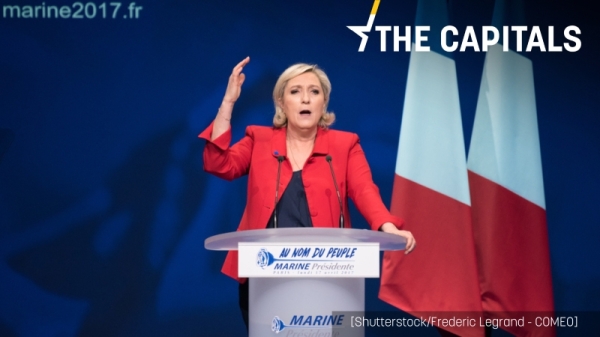Le Pen to face Russian interference hearing

Parliament’s committee of enquiry into foreign interference in politics will hear far-right leader Marine Le Pen on Tuesday – a highly anticipated hearing due to suspicions of links between her nationalist party and Russia.
The committee of enquiry was launched by Le Pen’s party, Rassemblement National (RN/ID), last September, after the majority and the left attacked her party over reported links between RN and Russia.
Chaired by RN MP Jean-Philippe Tanguy, the parliamentary commission heard for several months politicians and personalities to establish whether political, economic and financial interference from any foreign power could exist in France.
Within this framework, several elected representatives of Le Pen’s party were interviewed, and Le Pen herself will be asked questions this Wednesday. This comes after a committee member told EURACTIV at the start of May that she may not be called to appear as the hearings were likely completed.
Russian loan
One of the reasons to summon Le Pen is the loan taken out by her party in 2014, then called Front National, with Czech-Russian bank First Czech Russian Bank worth The loan was taken from a Czech-Russian bank (First Czech Russian Bank) for €9.4 million.
Still being repaid, the loan was mentioned by President Emmanuel Macron during the debate between the two rounds of the 2022 presidential election.
Former RN MEP Jean-Luc Schaffhauser indicated during his hearing on 4 May that Le Pen had instructed him to negotiate the loan when Western banks refused to provide financing to the far-right party. Schaffhauser also said that the funding of the RN was part of a search for “allies” in the West by the Kremlin, which endorsed the deal.
The micro-party Cotelec, owned by Jean-Marie Le Pen, Marine Le Pen’s father, also received a €2 million loan in 2014 from a Cypriot company, whose funds were allegedly supplied by a former Russian banker, close to Russian oligarch Konstantin Malofeev.
The RN benefited indirectly from these sums, having borrowed money from Cotelec for the 2017 elections.
Trips to Russia and controversial statements
Throughout the hearings, several elected or former elected members of the RN were interviewed, including two MEPs, Thierry Mariani and Philippe Olivier. The latter is Marine Le Pen’s son-in-law and one of her advisers.
The two MEPs have visited Russia several times and met people close to the government. For example, Philippe Olivier met Malofeev, who spearheaded a project to create a “union of the European extreme right”. Olivier denies having been informed of this project.
Trips to occupied Crimea were also made by Le Pen and members of her party, as well as some members of the right-wing party Les Républicains. On this occasion, they declared that they considered Crimea Russian. Furthermore, referendums or elections in Russia were described as “democratic” by party officials sent there as observers.
When President Vladimir Putin received her in April of the same year, she declared before the Duma that she wished to have the international sanctions against Russia lifted.
The former presidential candidate (2012, 2017, 2022) denies the link between these trips and funding received.
According to Jean-Philippe Tanguy, chairman of the committee and number two of the group, “no new fact brought to light by the previous hearings justifies this hearing,” he told AFP.
As in the case of hearings of other leaders of the RN, Tanguy will defer to the chairmanship of the committee, which will be exercised by vice-president Laurent Esquenet-Goxes, deputy of the presidential majority (MoDem/Renew).
The rapporteur of the committee of enquiry Constance Le Grip (Renaissance/Renew), is expected to deliver her report in early June.
(Davide Basso | EURACTIV.fr)
Read more with EURACTIV




